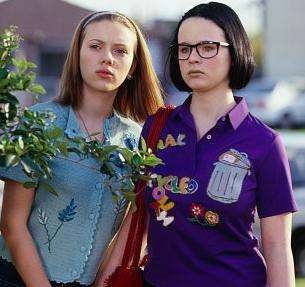Ghost World

Starting as an indie comic series by acclaimed graphic novelist Daniel Clowes, Ghost World appeared in Eightball #11-18 (June, 1993-March, 1997). It was later adapted into an equally acclaimed indie film, which was released in 2001. Both versions follow Deadpan Snarkers Enid Coleslaw and Rebecca Doppelmeyer as they face the summer after high school graduation. The film cast Thora Birch as Enid and Scarlett Johansson as Rebecca.
While conceptually similar, the comic and film differ in their featured characters. The character of Josh, an alienated friend (and quasi-love interest) of Enid's (and Rebecca's), plays a major role in the comic, while only being a side character in the film. Seymour, a lonely and cynical middle-aged man is a central character in the film, yet only appears for a few panels in the comic, a victim of one of Enid's pranks.
Enid and Rebecca's conversations would not be out of place in a Daria episode, though they lack the moral core which would make them that kind of Deadpan Snarker.
Definitely a darker look at the classic coming-of-age stories, much of Ghost World's popularity lies in its frank treatment of adolescence and alienation. It's also quite funny.
Not to be confused with the tropes Ghost Planet, Ghost Town or Ghost City.
Enid: "I think I'm going crazy from sexual frustration."
Rebecca: "And you haven't heard the miracle of masturbation?
- Deadpan Snarker: Enid, Rebecca, Josh, and (in the movie) Seymour.
- Eagle Land: Type 2. Enid's nameless town is a wasteland of strip malls populated by the lonely and troubled.
- Guess Who I'm Marrying: Enid's father remarries the worst possible (in Enid's opinion) of his previous romantic interests.
- No Celebrities Were Harmed: The male "Satanist" is a virtual dead-ringer for the late founder of the Church of Satan, Anton LaVey.
- Prank Date: What Enid pulls on Seymour, though it leads to very different outcomes in the film and the book.
- Significant Sketchbook: Seymour discovers Enid's sketchbook at one point, and feels crushed when he sees a portrait of himself portrayed as depressing and alone.
- Surrounded by Idiots: Most of Enid's classmates.
- This Loser Is You: Seymour.
- An argument can be made for Enid in the movie, much to the ire of fans of the original comic. The film comes off as a deconstruction of the comic.
- Ascended Extra: Seymour's character and plotline is greatly expanded from the comic.
- Composite Character: Seymour is based on the bearded windbreaker guy and Bob Skeetes from the comic. Also, Johnny "Apeshit" was merged into John Ellis.
- Dawson Casting: Oddly inverted - Scarlett Johansson was only 16 when the film was released and thus probably a year or two younger than her character.
- Deconstruction: Of the Deadpan Snarker character type.
- Heterosexual Life Partners: Enid and Rebecca.
- Hey, It's That Guy!: The film has a few. Thora Birch and Scarlett Johansson are the most obvious, but there's also Steve Buscemi, Tom McGowan (Kenny from Frasier), David Cross, Illeana Douglas, Bob Balaban, and Brian George; the last three all played fairly recognizable characters on Seinfeld.
- Also, Maxine is played by Teri Garr. Some of her better known roles include the Love Interest in Young Frankenstein and Phoebe's biological mom on Friends among others.
- Seymour's (very briefly seen) boss is Sheriff John Bunnell of World's Wildest Police Videos. Terry Zwigoff must be a fan of his because he also appeared in Bad Santa.
- And Bruce Glover (father of Crispin), Mr Wint, is the Wheelchair Guy.
- Le Film Artistique: The hilariously incomprehensible film made by Enid's clueless art teacher, Roberta Allsworth.
- Manic Pixie Dream Girl: Subverted. Enid genuinely tries to be this for Seymour, but She ends up ruining his life and her own in the process.
- Took a Level In Badass: Seymour in the Easter Egg.
- What Could Have Been: Daniel Clowes always wanted the male "Satanist" to be played by Anton LaVey.